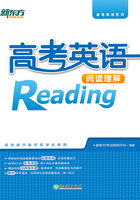
Passage 5
课标卷II A
My color television has given me nothing but a headache. I was able to buy it a little over a year ago because I had my relatives give me money for my birthday instead of a lot of clothes that wouldn’t fit. I let a salesclerk fool me into buying a discontinued model. I realized this a day later, when I saw newspaper advertisements for the set at seventy-five dollars less than I had paid. The set worked so beautifully when I first got it home that I would keep it on until stations signed off for the night. Fortunately, I didn’t get any channels showing all-night movies or I would never have gotten to bed.
Then I started developing a problem with the set that involved static (静电) noise. For some reason, when certain shows switched into a commercial, a loud noise would sound for a few seconds. Gradually, this noise began to appear during a show, and to get rid of it, I had to change to another channel and then change it back. Sometimes this technique would not work, and I had to pick up the set and shake it to remove the sound. I actually began to build up my arm muscles (肌肉) shaking my set.
When neither of these methods removed the static noise, I would sit helplessly and wait for the noise to go away. At last I ended up hitting the set with my fist, and it stopped working altogether. My trip to the repair shop cost me $62, and the set is working well now, but I keep expecting more trouble.
1. Why did the author say he was fooled into buying the TV set?
A. He got an older model than he had expected.
B. He couldn’t return it when it was broken.
C. He could have bought it at a lower price.
D. He failed to find any movie shows on it.
2. Which of the following can best replace the phrase “signed off ” in Paragraph 1?
A. ended all their programs
B. provided fewer channels
C. changed to commercials
D. showed all-night movies
3. How did the author finally get his TV set working again?
A. By shaking and hitting it.
B. By turning it on and off.
C. By switching channels.
D. By having it repaired.
4. How does the author sound when telling the story?
A. Curious.
B. Anxious.
C. Cautious.
D. Humorous.